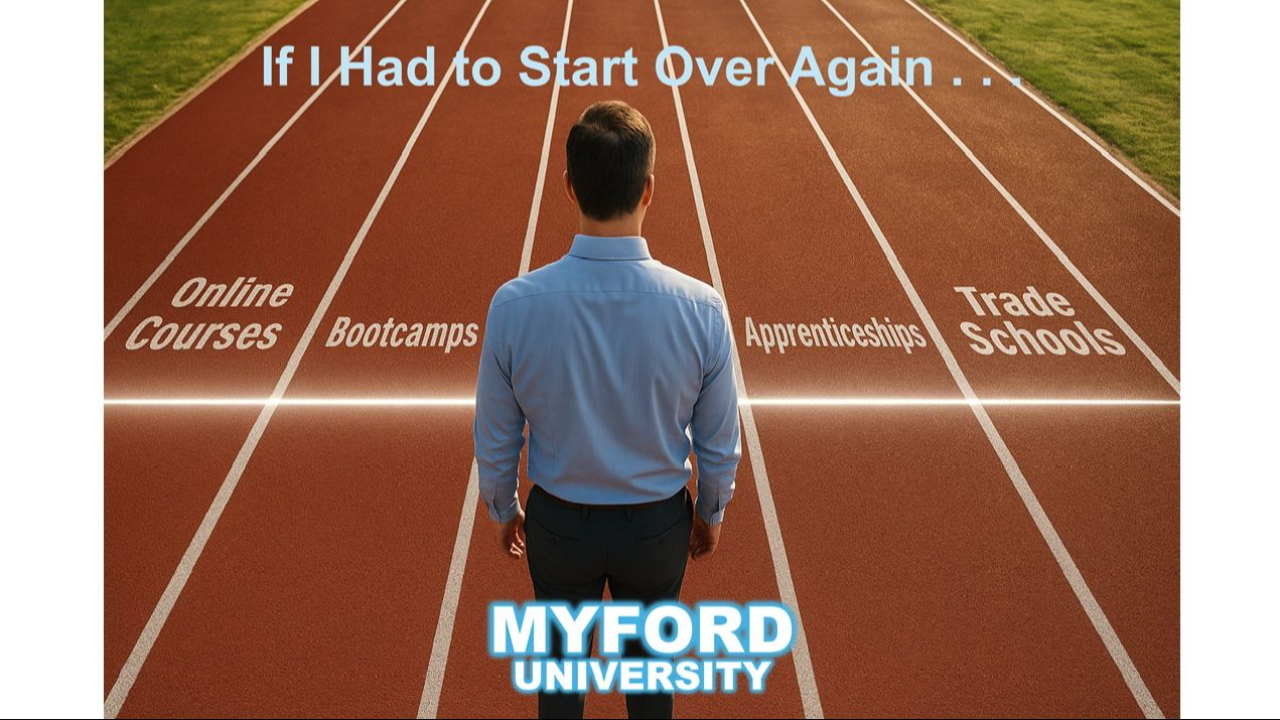If I Had to Do It Again… College, MBA, MS — What I Would Do Now
Jul 29, 2025
Rethinking the Traditional Education Path in the Age of Speed, Skills, and Self-Education
The Honest Reflection
Let’s start with a hard truth.
Most people never pause to ask:
“Was it worth it?”
Not emotionally.
Not financially.
Not strategically.
Not in light of the world we live in now.
They went to college because they were told to.
They pursued the MBA because it seemed like the next rung.
They got the MS because it looked “smart” on a resume.
I did all three.
And I don’t regret the effort—but I sure as hell would rethink the strategy today.
So this is the article I wish someone had written for me.
Let’s explore:
- What I did
- What I got
- What I missed
- And exactly what I’d do if I had to start over today
Part 1: College — The Default That Needs a Reboot
What I Did:
Like most high school graduates, I went to college straight after graduation.
It felt automatic:
- “Everyone goes”
- “It’s the next step”
- “It’s what successful people do”
And back then, it made a kind of sense.
The internet wasn’t mature.
Online courses didn’t exist.
College was one of the only gateways to knowledge and a professional network.
So I spent four years, tens of thousands of dollars, and left with a degree—and not much else.
What I Got:
- A general education
- Some exposure to new ideas
- A social network
- A diploma that got me my first job interview
But also:
- Zero real-world experience
- No portfolio of business work (I did have a design portfolio)
- No idea how business actually operates
- No skills that mattered in the real world
Most importantly:
I didn’t learn how to think.
I learned how to study.
What I’d Do Now:
If I were 18 again in today’s world?
I’d skip the dorms and lecture halls.
Instead, I’d:
- Work full-time in any job that puts me around skilled adults
- Freelance or side hustle to learn marketing, sales, and operations
- Read and write every day
- Take online courses to build my skills (copywriting, data, finance, AI, strategy)
- Join a mastermind or mentor group for feedback and access
- Build and ship projects to prove value
- Document everything in a public portfolio
That would give me:
- Money instead of debt
- Experience instead of theory
- Proof instead of just paper
- Network instead of name-drop schools
- A head start on real results
Part 2: The MBA — What It Promised vs. What It Delivered
What I Did:
After a few years in the working world, I did what many aspiring professionals do—I got an MBA.
It promised:
- A bump in salary
- A broader network
- A stamp of approval from a respected institution
So I studied case studies.
Learned to speak the language of strategy.
Practiced frameworks and slide decks.
And I’ll admit—some of it was useful.
But not $100,000+ useful.
What I Got:
- Some strategic vocabulary
- A few smart classmates
- A network I hardly leveraged
- A diploma that helped with middle-management promotions
But I didn’t learn:
- How to build a business from scratch
- How to scale a company
- How to lead under pressure
- How to sell, pitch, and negotiate
- How to spot and seize opportunity
It was business theory—not business execution.
What I’d Do Now:
If I could do it over?
I’d skip the MBA and instead build a real-world MBA around these 3 pillars:
- Revenue Skills
- Copywriting
- Offers and pricing
- Sales funnels
- Customer acquisition
- Positioning
- Operating Skills
- Systems thinking
- Business models
- Delegation and hiring
- Data-driven decision making
- AI and automation tools
- Strategic Thinking
- Mental models
- First-principles problem solving
- Scenario planning
- Value chain analysis
- Negotiation
I’d learn by:
- Building and running a real micro-business
- Investing in $500–$5,000 niche online programs with expert access
- Studying founders, operators, and rainmakers—not professors
I’d walk away with:
- Revenue
- Proof of work
- An actual portfolio of wins (and some losses—which is where you really learn)
- A stronger network of doers
- 10x more confidence
Part 3: The MS — The Deep Dive That Rarely Pays Off
What I Did:
Like many professionals trying to specialize, I pursued a Master of Science in a focused domain.
The pitch was simple:
“Double down. Become a subject-matter expert in a second area.”
So I went in deeper: statistics, models, analytics, research.
It was hard, intellectually interesting, and looked impressive on paper.
What I Got:
- More specialized vocabulary
- The ability to “talk shop” with academics
- Some additional analytical rigor
- Another debt burden
But here’s the issue:
Specialization is only useful if:
- The domain stays relevant
- You apply it in the real world
- The marketplace demands it
And the shelf life of academic knowledge is shrinking.
What I learned in that MS program was outdated within a few years of graduation.
What I’d Do Now:
If I needed deep expertise today?
I’d pursue stacked micro-certifications, workshops, and projects.
Not a monolithic MS or a PhD degree.
Why?
- It’s faster
- It’s more affordable
- It’s always current
- It’s hyper-focused on application, not theory
I’d identify the 1–2 specific skills I need and master those through:
- Applied learning
- Mentorship
- Use in live environments
- Rapid iteration and feedback
That gets you expertise and relevance.
And in today’s world—relevance is everything.
Part 4: What It All Comes Down To
The old model said:
Go to college → Get a degree → Get an MBA/MS or PhD→ Get promoted → Be set for life
That world is gone.
The new model is:
Learn fast → Apply immediately → Build proof → Stay nimble → Earn leverage
It’s not about credentials. It’s about:
- Skills
- Experience
- Speed
- Network
- Results
And most of that doesn’t require a campus.
Part 5: What I’d Tell My 18, 25, and 30-Year-Old Selves
At 18:
“Forget status. Learn how the world actually works. Master sales, copywriting, and communication. Start working. Document everything.”
At 25:
“Don’t chase degrees. Chase leverage. Learn how to build systems, manage people, and deliver results. Start a side business.”
At 30:
“Specialize by solving problems, not collecting titles. Build things that matter. Invest in mentors, not middlemen.”
Conclusion: Education is Not the Same as Schooling
If I had to do it all again?
I’d skip the conventional path.
Not because I’m anti-education.
But because I’m pro-results.
Real education is what prepares you to:
- Think independently
- Act decisively
- Create value
- Lead with clarity
- Earn what you’re worth
- And never be stuck waiting for permission again
Degrees don’t guarantee that.
But you can.
So if you're wondering whether to go back to school—or go forward into skill-building, execution, and self-education…
Here's my answer:
Don't go back. Go forward.
This is the age of leverage.
And the future belongs to those who think differently.
Welcome to Myford University.
Stay connected with news and updates!
Join our mailing list to receive the latest news and updates from our team.
Don't worry, your information will not be shared.
We hate SPAM. We will never sell your information, for any reason.

